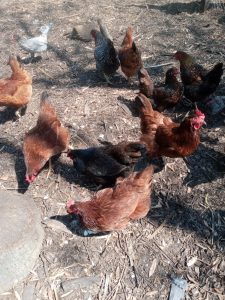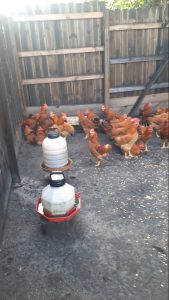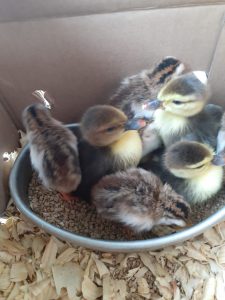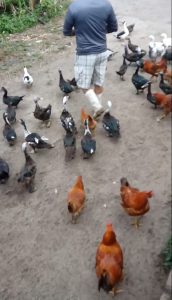It is important to maintain a healthy backyard flock. One unhealthy chicken can infect the entire flock with a disease, creating problems that can, in certain cases, result in death. To help us minimize the risk of diseases and pest infestations, implementing a good biosecurity program for our backyard chickens is crucial. Biosecurity can be defined as the implementation of best management practices to decrease biological risk, such as disease and pest infestations.

Why is observation the first step in a biosecurity program?
Observation is key to maintaining a good biosecurity program. When we have backyard chickens, we must observe three main factors: the birds, the structures, and the environment:
1. Birds – Any departure from normal behavior or appearance can be an indication of disease:
- Know your birds normal behave and look for signs of any sudden change. Note how long they have been acting or looking this way (If possible, specify the date when it started).
- Verify how many birds are behaving or looking different than normal.
- Ask yourself if this change in behavior or appearance has happened before.
- Some of the symptoms we can observe in the chickens are lameness, lack of appetite, diarrhea, blisters, swelling, decrease in egg production, coughing, depression, and in the worst-case scenario, death, and high mortality.
2. Structures – All structures must be clean and working properly:
- Verify that the structures are clean, and no mold or fungus is growing in the area where the chickens roam.
- Verify that the waterers and feeders are functioning correctly, and that they are free of any external contamination such as feces.

3. Environment – The presence of humidity and pest can affect your chickens:
- Verify that the chicken litter is not wet and change it periodically to avoid high humidity levels.
- Avoid the presence of rats and mites in the area where chickens are present and prepare an Integrated Pest Management Program to control these pests.
How can I prevent disease within my chickens?
There are six main ways to prevent disease in backyard chickens:
1. Keep your distance
- Restrict the access to your property and birds.
- Use clean boots when entering the area where chickens are present.
- Develop a pest control program
2. Keep it clean
- Use clean clothes when handling the chickens.
- Always wash your hands before and after handling the chickens.
- Maintain clean structures such as pens, feeders, waterers, and chicken litter. (Replace any broken structures).

3. Don’t take disease to your home
- Always disinfect all tools after handling your chickens.
- When introducing new birds, quarantine and observe them for at least 30 days.
- Remove any chicken with signs of disease from the flock and designate a place for observation.
4. Don’t borrow disease from your neighbor
- Never share your equipment or birds with neighbors, and always try to avoid using tools that don’t belong to you. If you don’t have any other option, disinfect all borrowed items before using them with your birds.
5. Know the warnings of infectious birds
- Observation is key. Appearance or behavior outside of the norm could be an indication of disease.
6. Report sick birds
- If you have sick birds and don’t know what disease is causing it, don’t self-medicate your birds. Call an expert, such as a veterinarian, a USDA/APHIS inspector, or your local Extension Agent for a proper orientation of how to handle the disease.
What are the recommendations to prevent disease transmission within humans and chickens?
- Wash your hands with soap before and after managing the chickens.
- Supervise all children that have contact with the birds (No children younger than five years old should handle chickens).
- If water is not available, used hand sanitizer.
- Do not let chickens inside your house, especially in the eating areas.
- It is recommended that adults older than 65 years old or people with weakened immune system should not handle chickens.
- If you consume your chickens’ eggs, wash them thoroughly before using them to cook with.
- Do not eat in the areas where chickens are present.
- Avoid touching your mouth when handling chickens.
- Do not clean and disinfect your chicken tools inside the house. Designate an area outside for this process.
- It is recommended to buy birds from hatcheries that participate in the U.S. Department of Agriculture National Poultry Improvement Plan (USDA-NPIP).

Conclusion
To avoid having unnecessary problems within your flock of chickens, it is important to implement a biosecurity system. Observation and cleanliness are extremely important to maintain your chicken’s health. Remember that timeliness of disease identification can help avoid the dissemination of a disease among all your chickens.
For more information about backyard Chickens access Allie Williams Blogpost called: Backyard Chickens: External Parasite.
University of Florida is an equal opportunity Institution
 0
0
